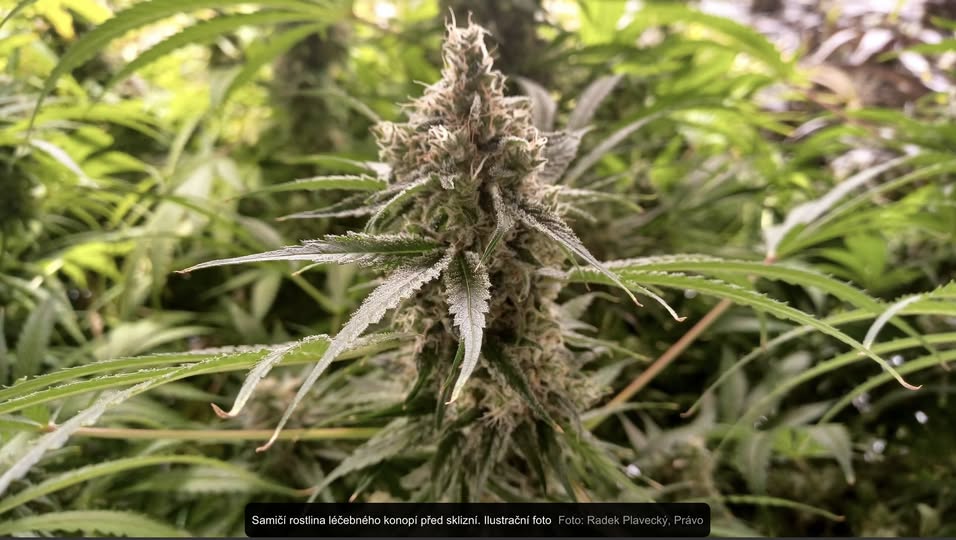Only Robert Veverka, the editor-in-chief of the magazine Legalization, found a defense at the Constitutional Court. The judiciary fined him 100,000 crowns for spreading toxic addiction. According to the verdict of the Constitutional Court However, it is necessary to emphasize freedom of expression and criticism of the current legislation is a contribution to the society-wide debate.
The complainant, together with the company of which he is the managing director, was found guilty of the offence of dissemination of intoxication, as they incited the abuse of a substance other than alcohol and committed the offence through the press and a publicly accessible computer network. As editor-in-chief since the end of 2010, the complainant published the magazine Legalization, which focused on cannabis cultivation and the effects of THC (tetrahydrocannabinol). Some of the articles published in that magazine promoted cannabis and THC in a way that was likely to lead readers to decide to use it as an addictive (rather than medicinal) substance. The complainant was therefore found guilty of the offence of dissemination of intoxication by the District Court and sentenced to a term of imprisonment of twelve months, suspended for two years and six months. The Regional Court reduced the sentence to a fine of CZK 100 000. The Supreme Court rejected the complainant's appeal.
https://twitter.com/usoud_official/status/1866484368815857939
The First Chamber of the Constitutional Court (Judge-Rapporteur Tomáš Langášek) upheld the constitutional complaint and annulled the contested order of the Supreme Court and the judgment of the Regional Court because they did not respect the complainant's right to freedom of expression and the right to disseminate information guaranteed by Article 17(1) and (2) of the Charter of Fundamental Rights and Freedoms.
The Constitutional Court adhered to its established case law emphasizing the importance of freedom of expression in a democratic society. Without free debate - even on controversial issues such as substance abuse - democracy cannot function effectively. However, freedom of expression is not absolute; the Charter itself implies limitations on it. However, any interference with this fundamental right must pass the proportionality test.
There is no doubt that the criminalization of the act of inciting the abuse of an addictive substance, i.e. the offence of dissemination of intoxication, pursues a legitimate aim, namely the protection of the rights and freedoms of others against the harmful effects of addictive substances, the protection of public health, or the protection of morality.
The Constitutional Court stated that the dissemination of information related to the issue of cannabis use, including criticism of the current legislation, is a contribution to the social debate on issues of public interest. Such speech may therefore be restricted on an exceptional basis, in order to protect important objectives and if absolutely necessary in a democratic society. Contributions to the debate on the prevention and effects of substances contained in cannabis are also strongly protected. These too are related to issues of public interest, in particular the protection of public health.
The General Courts defined the essence of the complainant's conduct as the complainant, through texts published in a magazine, highlighted the effects of substances contained in cannabis, gave the impression of the legality of its cultivation, and published instructions for growing cannabis and for the production of concentrated preparations from cannabis, articles and advertising aimed at the sale of cannabis seeds and highlighting the active substances and other equipment necessary for their cultivation, processing and use, and distributed feminised cannabis seeds as a supplement to the magazine. The complainant was therefore not convicted of publishing the magazine as such. On the contrary, the general courts acknowledged the objective nature of most of the articles published and considered the overall focus of the magazine on informing the public to be a mitigating factor in imposing the sentence.
Both the Constitutional Court and the European Court of Human Rights have repeatedly emphasized the strictly individual assessment of the nature of each speech, especially with regard to the context in which it was made. That is precisely the assessment which the courts made in concluding that, by publishing articles with the content described above, the applicant had incited the abuse of THC. The specific articles, the publication of which, in the view of the courts, fulfilled the offence of dissemination of intoxication, were listed directly in the operative part of the judgment, which is consistent with the aforementioned requirement of a strictly individual assessment.
However, the Constitutional Court agrees with the complainant that the municipal courts were not consistent in this respect and that the factual sentence also includes articles whose criminal sanction cannot be accepted from a constitutional point of view. Such a description of the offence makes it clear that these expressions also contributed to the fulfilment of the offence, even though they may not have fulfilled it in themselves, thus chilling the public debate (chilling effect).

First of all, we should mention the article that deals with the issue of criminal proceedings against the owners of the so-called growshops, opposing the criminalization of the described conduct, and the article that compares the danger of using mushrooms with the use of alcohol. These articles are textbook examples of constitutionally strongly protected speech on matters of public concern, specifically the setting of state criminal policy in relation to addictive substances. Yet the challenged decisions do not show how criticism of the criminalization of conduct related to THC abuse encourages its abuse. There are also articles which the complainant describes as 'education', summarising the results of various studies and dealing with the effects of the substances contained in cannabis on the human body. Finally, there are instructions on the use of cannabis for the production of various ointments, tinctures and oils. The publication of those articles also falls within the scope of the complainant's right to disseminate information which, again in this case, concerns health and thus contributes to a certain extent to the public debate.
The reasoning of the general courts that they considered the complainant's conduct as a whole and took into account its overall context cannot stand. The prosecuting authorities first separated out only the 'objectionable' articles from the content of the magazine and, after the complainant had argued that there were some articles which could not be considered criminal, argued that his conduct had been considered as a whole. Moreover, it is not clear why the operative part of the sentence would list specific articles if it was not by publishing them that the complainant had committed the offence.
Given the importance of freedom of expression, it is unacceptable that even a minor part of an otherwise lengthy sentencing opinion should criminalize the constitutionally protected exercise of these fundamental political rights.
The cardinal importance of freedom of expression in a democratic state governed by the rule of law must always lead in borderline situations to prioritise its protection, even at the cost of leaving some potentially harmful speech unpunished, otherwise we risk much more.
Together with his constitutional complaint, the complainant also filed a motion to repeal Section 287 of the Criminal Code, which establishes the criminal offence of dissemination of intoxication. The Constitutional Court found this motion to be manifestly unfounded. In particular, the complainant questioned the way in which this provision was applied in practice, but this was not a reason for its annulment. The Constitutional Court does not assess the limits of the criminalisation of certain types of conduct and therefore will not assess the legislator's decision to exclude alcohol from the scope of the offence of dissemination of intoxication.
Decision Case No. I. ÚS 1933/24 is available  here (612 KB, PDF).
here (612 KB, PDF).
ÚS/ gnews - RoZ



